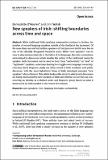| dc.contributor.author | O'Rourke, Bernadette | |
| dc.contributor.author | Walsh, John | |
| dc.date.accessioned | 2017-03-13T15:49:17Z | |
| dc.date.available | 2017-03-13T15:49:17Z | |
| dc.date.issued | 2014-12-18 | |
| dc.identifier.citation | O Rourke, B.M.A. & Walsh, J. (2015) 'New Speakers of Irish: shifting boundaries across time and space'. International Journal of the Sociology of Language, 2015 (231):63-83. | en_IE |
| dc.identifier.issn | 1613-3668 | |
| dc.identifier.uri | http://hdl.handle.net/10379/6391 | |
| dc.description.abstract | While traditional Irish-speaking communities continue to decline, the number of second-language speakers outside of the Gaeltacht has increased. Of the more than one and half million speakers of Irish just over 66,000 now live in one of the officially designated Gaeltacht areas. While new speakers can beseen to play an important role in the future of the language, this role is sometimes undermined by discourses which idealise the notion of the traditional Gaeltacht speaker. Such discourses can be used to deny them authenticity as real or legitimate speakers, sometimes leading to struggles over language ownership. Concerns about linguistic purity are often voiced in both academic and public discourse, with the more hybridized forms of Irish developed amongst new speakers often criticised. This article looks at the extent to which such discourses are being internalised by new speakers of Irish and whether or not they are constructing an identity as a distinct social and linguistic group based on what it means to be an Irish speaker in the twenty first century. | en_IE |
| dc.description.sponsorship | This article was written during Bernadette O’Rourke’s research
leave as part of an Arts and Humanities Research Council (UK) Fellowship
for the project “New Speakers of Minority Languages and their role in Linguistic
Revitalization” (Grant number AH/J00345X/1). The authors would like to acknowledge
financial support for additional transcriptions from the Community
Knowledge Initiative, National University of Ireland, Galway. | en_IE |
| dc.format | application/pdf | en_IE |
| dc.language.iso | en | en_IE |
| dc.publisher | De Gruyter Open | en_IE |
| dc.relation.ispartof | International Journal of the Sociology of Language | en |
| dc.rights | Attribution-NonCommercial-NoDerivs 3.0 Ireland | |
| dc.rights.uri | https://creativecommons.org/licenses/by-nc-nd/3.0/ie/ | |
| dc.subject | Irish | en_IE |
| dc.subject | authenticity | en_IE |
| dc.subject | New speakers | en_IE |
| dc.subject | Language ideologies | en_IE |
| dc.subject | Authenticity | en_IE |
| dc.title | New speakers of Irish: shifting boundaries across time and space | en_IE |
| dc.type | Article | en_IE |
| dc.date.updated | 2017-03-13T15:39:22Z | |
| dc.identifier.doi | 10.1515/ijsl-2014-0032 | |
| dc.local.publishedsource | https://www.degruyter.com/view/j/ijsl.2015.2015.issue-231/ijsl-2014-0032/ijsl-2014-0032.xml?format=INT | en_IE |
| dc.description.peer-reviewed | peer-reviewed | |
| dc.contributor.funder | |~|1267875|~| | |
| dc.internal.rssid | 5456071 | |
| dc.local.contact | John Walsh, Áras Na Gaeilge, Oé Gaillimh. 2563 Email: john.walsh@nuigalway.ie | |
| dc.local.copyrightchecked | No | |
| dc.local.version | PUBLISHED | |
| nui.item.downloads | 897 | |


